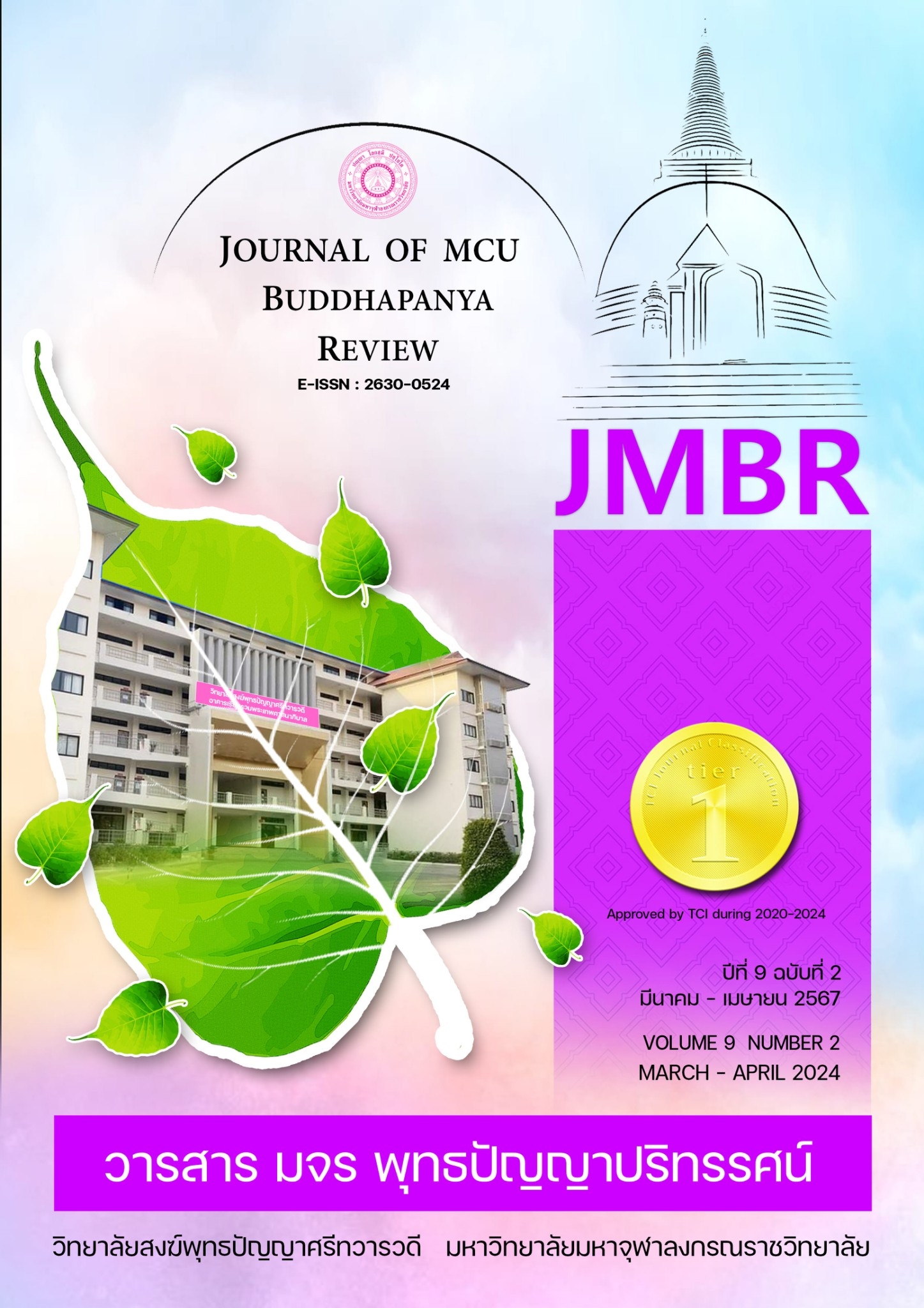ENHANCING COMMUNITY ECONOMIC SUSTAINABILITY BASED ON CULTURAL CAPITAL AND LOCAL WISDOM KNOWLEDGE MANAGEMENT : A CASE OF KLONG MADUEA, SAMUT SAKHON
คำสำคัญ:
knowledge management (KM); , community; , economic sustainability;บทคัดย่อ
The objectives of this study are to Using Klong Makduea, Samut Sakhon for a case study, this study aimed to organize national and local culture-related research activities. The benefits could enhance the economic sustainability of a community based on cultural capital and local wisdom knowledge management. Purposive sampling from 8 university staff and 108 respondents who were community villagers was adopted for data collection by observations and qualitative approach. Content analysis was used for its interpretation based on knowledge management and sustainability theories regarding natural resources for environmentally friendly products. The findings revealed that the participants perceived knowledge management as essential for enhancing economic sustainability by adopting cultural capital and local knowledge management. Due to community business growth, the culture and local wisdom are excellent capitals for sustainability, both micro and macroeconomics. Community participation could be enhanced by using environmentally friendly products that do not permanently harm the environment and are very healthy for people's lives in the long run. Conclusion and Recommendations The statement presents a positive perspective on the potential benefits of knowledge management, cultural capital, and local wisdom for promoting economic sustainability and community engagement. The limitation is that without specific information about the study or the context in which it will be conducted, it is difficult to assess the validity and generalizability of these findings in quantitative research. It would be necessary to evaluate the study methodology, the participant characteristics, and the specific evidence supporting the stated perceptions, particularly for the structural equation model generally explaining to confirm the hypotheses for further study.
เอกสารอ้างอิง
Aini, D. N., & Winarno, A. (2022). Cultural Heritage Folk Crafts Management: Contribution to the Welfare and Stability of Local Wisdom. Technium Social Sciences Journal, 31, 685-692.
Almaqtari, F. A., Elsheikh, T., Al-Hattami, H. M., & Mishra, N. (2023). The impact of board characteristics on environmentally friendly production: A cross country study in Asia and Europe. Journal of Cleaner Production, 392, 136257.
Bresciani, S., Rehman, S. U., Giovando, G., & Alam, G. M. (2023). The role of environmental management accounting and environmental knowledge management practices influence on environmental performance: mediated-moderated model. Journal of Knowledge Management, 27(4), 896-918.
Budiana, H. R., Bajari, A., & Mulyawan, R. (2022). Knowledge Management about Local Wisdom in Implementation of Public Policies. Webology, 19(1), 6441-6450.
Demir, A., Budur, T., Omer, H. M., & Heshmati, A. (2023). Links between Knowledge management and organizational sustainability: does the ISO 9001 certification have an effect?. Knowledge management research & practice, 21(1), 183-196.
Gardeazabal, A., Lunt, T., Jahn, M. M., Verhulst, N., Hellin, J., & Govaerts, B. (2023). Knowledge management for innovation in agri-food systems: a conceptual framework. Knowledge management research & practice, 21(2), 303-315.
Kok, S. L. (2023). A Strategic Cooperative Model: The Case of Islamic Financing Hub. Advance Knowledge for Executives, 2(1), 1-15.
Lamproma, W., Poommai, S., Bhumkittipicha, P., Meelac, N. & Jotaworna, S. (2023). The patterns and roles of people's network in water resource conservation in urban areas, Thailand. Water Conservation & Management, 7(1); 19-27.
DOI: http://doi.org/10.26480/wcm.01.2023.19.27
Lim, L. (2023). Digital Marketing Strategies: A Case of Charles & Keith. Advance Knowledge for Executives, 2(2), 1-11.
Limna, P., & Kraiwanit, T. (2022). Service Quality and Its Effect on Customer Satisfaction and Customer Loyalty: A Qualitative Study of Muang Thai Insurance Company in Krabi, Thailand. Journal for Strategy and Enterprise Competitiveness, 1(2), 1-16.
Moslehpour, M., Chau, K. Y., Du, L., Qiu, R., Lin, C. Y., & Batbayar, B. (2023). Predictors of green purchase intention toward eco-innovation and green products: evidence from Taiwan. Economic Research-Ekonomska Istraživanja, 36(2), 2121934.
Rusch, M., Schöggl, J. P., & Baumgartner, R. J. (2023). Application of digital technologies for sustainable product management in a circular economy: A review. Business Strategy and the Environment, 32(3), 1159-1174.
Sarfraz, M., Ivascu, L., Artene, A. E., Bobitan, N., Dumitrescu, D., Bogdan, O., & Burca, V. (2023). The relationship between firms' financial performance and performance measures of circular economy sustainability: an investigation of the G7 countries. Economic Research-Ekonomska Istraživanja, 36(1), 2101019.
Shehzad, M. U., Zhang, J., Latif, K. F., Jamil, K., & Waseel, A. H. (2023). Do green entrepreneurial orientation and green knowledge management matter in the pursuit of ambidextrous green innovation: A moderated mediation model. Journal of Cleaner Production, 388, 135971.
Siripipatthanakul, S., Jaipong, P., Limna, P., Sitthipon, T., Kaewpuang, P., & Sriboonruang, P. (2022, a). The Impact of Talent Management on Employee Satisfaction and Business Performance in the Digital Economy: A Qualitative Study in Bangkok, Thailand. Advance Knowledge for Executives, 1(1), 1-17.
Siripipatthanakul, S., Limna, P., Siripipattanakul, S., & Auttawechasakoon, P. (2022, b). The Impact of TPB Model on Customers' Intentions to Buy Organic Foods: A Qualitative Study in Angsila-Chonburi, Thailand. Psychology and Education Journal, 59(2), 419-434.
Spangenberg, J. H. (2005). Economic sustainability of the economy: concepts and indicators. International journal of sustainable development, 8(1-2), 47-64.
Than, S. T., Le, P. B., Le, T. P., & Nguyen, D. T. N. (2023, February). Stimulating product and process innovation through HRM practices: the mediating effect of knowledge management capability. In Evidence-based HRM: a Global Forum for Empirical Scholarship (Vol. 11, No. 1, pp. 85-102). Emerald Publishing Limited.
Watthanachanobon, W., & Chantaranamchoo, N. (2020). A Local Wisdom Knowledge Management Model to Enhance Economic Value Added for Textile Products of Thai-Yuan Ethnic Groups in Mid-Central Provincial Cluster. Journal of Community Development Research (Humanities and Social Sciences), 13(4), 9-24.
Yuliana, E., Yusuf, M., Nirmalasary, T. N., Amri, N. H., Erlyn, P., Hariani, P. L., & Hidayat, B. A. (2021). Natural Resources and Environment Management for the Development of Local Wisdom. Budapest International Research and Critics Institute (BIRCI-Journal): Humanities and Social Sciences, 4(4), 8248-8254.
ดาวน์โหลด
เผยแพร่แล้ว
รูปแบบการอ้างอิง
ฉบับ
ประเภทบทความ
สัญญาอนุญาต
ลิขสิทธิ์ (c) 2024 วารสาร มจร พุทธปัญญาปริทรรศน์

อนุญาตภายใต้เงื่อนไข Creative Commons Attribution-NonCommercial-NoDerivatives 4.0 International License.



